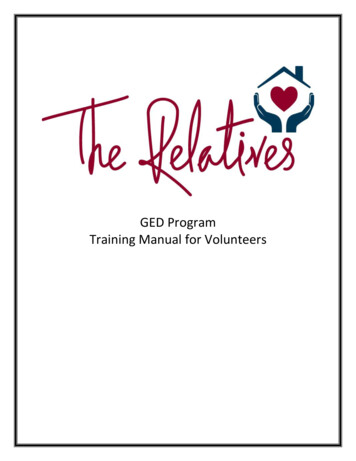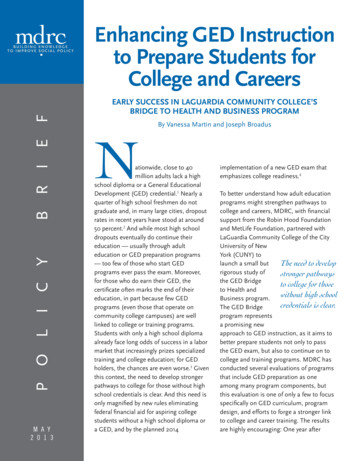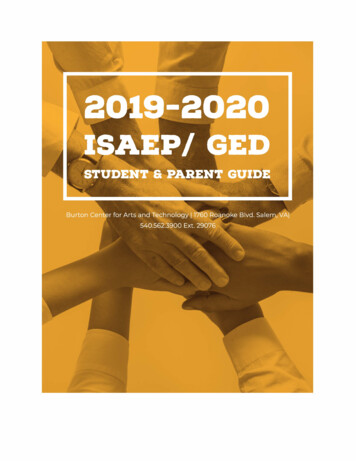
Transcription
GED ProgramTraining Manual for Volunteers
The Relatives keeps kids safe and familiestogether while preparing youth and youngadults to be healthy, productive, and engagedmembers of the community.The Relatives provides youth and young adultsin crisis with: Relief in place of despair Acceptance in place of rejection Empowerment in place of helplessness
Thank you for your interest in The Relatives’ GED Program. The program serves young adults,aged 16-24, who are enrolled at the On Ramp Resource Center.The GED program seeks to provide young adults with the support and guidance necessary toachieve their educational goals“I never leave On Ramp thinking I’ve wasted my time and am proud of the impact thisprogram makes in these young adult’s lives.”-Ted Northrup, Rock Star Volunteer & GED TutorGED Tutors Must: Be 18 years or older Consent to a background check Complete a Diana Screening Attend a Volunteer Orientation Commit to, at least, one hour-long tutoring session per weekCOVID-19 Policy: All volunteers interacting directly with the young adults served by The Relatives arerequired to show proof of vaccination You can learn more about The Relatives’ vaccination policy here Masks are required when visiting the On Ramp Resource Center Please be respectful of the health, safety, and comfort-level of program participants andstaffWhat to expect from On Ramp’s GED Tutoring ProgramThe purpose of this guide is to give you the tools and resources necessary to help a youngperson achieve their educational goals.Understanding the background of some On Ramp participants:A majority of the young adults who visit On Ramp have some form of trauma or areexperiencing other mental health issues which can manifest itself in challenging behaviors and what may appear as - poor decision making. Please be patient with the young adult you’retutoring and understand that you are making a difference even if it doesn't appear so at thetime.The challenges faced by many of the young adults at On Ramp can have an adverse effect onachieving their long-term goals. Their short-term needs (food, shelter) can sometimesoverwhelm and make it more difficult to see the benefits associated with obtaining their GED.Transportation can also be a burden for these young adults. Many On Ramp participants do nothave access to a car and must rely on public transportation. On Ramp does provide CATs bus
passes to young adults working towards their GEDs. However, navigating the public transitsystem can be complicated and time-consuming. The Relatives does offer a virtual tutoringoption for young adults who find transportation issues prohibitive.Many program participants are also experiencing homelessness and lack of natural supports,which may also affect behaviors, and decision making. Having patience with the young adultyou’re tutoring and empathizing with how their experiences color their world view can go along way to establishing trust.Setting a young adult up for successFor many of the young adults at On Ramp, obtaining their GED Diploma is the first step on apath to a stable, independent future.In addition to learning Math, Science, Social Studies, and Language Arts), GED programparticipants also learn the importance of commitment. When a young adult commits to theGED program and to you, their tutor, it is critical they arrive on time and ready to learn. If a GEDprogram participant is unable to attend their previously scheduled session, then it is theirresponsibility to communicate this with their tutor.Because some of the young adults enrolled in the GED program are experiencing trauma ordifficulties in their personal lives, they will occasionally bring their problems into the classroom.If the young adult you’re tutoring appears to be going through a difficult time, then give themthe space to speak openly about the issues they’re facing.Many of the young women working towards their GEDs have children of their own. Children arenot typically allowed in the GED classroom during a tutoring session. For young adults receivingtheir instruction virtually, it is not advisable to have their children in the room while they’rebeing tutored.Finally, some On Ramp participants utilize marijuana. This can make it difficult for the studentto concentrate or retain information. If the young adult you’re tutoring appears high, then youcan simply tell them they don’t seem ready to learn and you would like to reschedule thesession. Please refrain from making an accusation or asking about drug use, as this can lead tobroken trust.Motivating Young AdultsMotivating a young adult to work towards their GED can be an exercise in deferredgratification; typically not a strong area for teens and young adults! To many programparticipants, the final GED test will probably seem unreal or far-off in a distant, unobtainablefuture. Try to give whatever subject you’re reviewing some relevance to everyday life. This canespecially important in Math. Finally, ask the young adult you’re tutoring about their dreamsand aspirations on a regular basis. Help them understand obtaining their GED is an importantstep to achieving their dreams.
GED Program ResourcesIn addition to the information regarding On Ramp program participants above, there are anumber of practical resources for GED tutors built by people like yourself who have dedicatedtheir time to helping others.GED Client Progress SheetThe GED Client Progress Sheet is a Google Spreadsheet that contains all the active participantsin the GED program. Inactive volunteers, participants, and graduates are purged approximatelyonce per quarter. When you sign up as a tutor, you will receive a link via email giving you accessto this shared resource. The security of this sheet is controlled by Google, so you must have aGoogle Account (usually in the form of a Gmail address) in order to gain access to theserecords.This document allows multiple GED tutors and On Ramp staff to monitor a GED programparticipant’s progress.Tutors can also utilize this tool to access additional resources related to the text we use toteach program participants, Barron’s How To Prepare For The GED Test. While the book does agood, consistent job preparing a participant to take the GED test, the resources listed belowprovide additional information GED Client Progress Sheet G.E.D. Client Progress Sheet - Google SheetsGED Resources by Discipline and Lesson GED Resources by Discipline and Lesson Google SheetsMath Bootcamp Math Bootcamp for Beginning GED StudentsClient Progress Sheet Access:GED tutors can request access by emailing Ted Northrup at ted.northrup@gmail.comIn order to access and update the materials described above, the link must be sent to a Gmailaddress. Gmail is free and does not need to be your primary email address. Tutors without aGmail address have read-only access to the worksheets.Worksheet Tabs:There is one tab per student. For existing students, we will try to keep the sheet tabs in dateorder. Students who have access the GED program most recently will have tabs listed first. Forthe resources sheet, there’s one tab for each test. (e.g. Math, Social Studies, Science, and Lang.Arts).Worksheet Columns:Most of these columns are self-explanatory. Under “SUBJECTS COVERED, PROGRESS NOTES,NEXT STEPS” please type in what the client accomplished during your session and what, ifanything you assigned for homework. Student contact information are included if you need to
follow-up with a student. Case Manager Contact information is included here, as well. You areencouraged to contact the Case Manager from time to time to let them know how your studentis doing. If you find new resources that help a client understand or memorize the material intheir GED text book, then please add these to the Resources Sheet.New Students:If you get a new student, simply rename one of the “BlankSheet4New” tabs. You can click onthe down arrow next to each tab to see a menu that will allow you to rename the tab.Help:Call Ted Northrup at (704)-617-1441 or Savoui Graham at 704-501-8249 for assistance whenusing this system.Role of the Case ManagerMany of the clients in the GED program are either assigned to a Case Manager or are wait-listedfor one. Some of the hardships these young adults have endured, or are currently facing can behard for many of us to imagine. Case Managers work to help them through crisis. Casemanagers are professionally trained social workers and have the skill set necessary to assistthese young adults. Please keep an open line of communication between you and the casemanager. A once-a-month email updating the case manager on a young adult’s progress helpsOn Ramp staff receive a more complete picture of a young adult’s progress.Staff Contact NumbersNamePhone Number PositionGeorgetta Bouie 704-501-8273Lead Transition SpecialistDerrick Reynolds 704-501-8276Transition SpecialistRichard Simpson 704-501-8246Transition SpecialistGenine Donovan 704-501-8245On Ramp SupervisorSavoui Graham704-501-8249Employment Readiness SpecialistChristina Nunez704-501-8258Volunteer Engagement Officer
Next Steps: Attend a Volunteer Orientation Complete Background Check paperwork Complete your Diana Screening Create your Gmail account, if you don’t already have one
GED program and to you, their tutor, it is critical they arrive on time and ready to learn. If a GED program participant is unable to attend their previously scheduled session, then it is their responsibility to communicate this with their tutor. Because some of the young adults enrolled in the GED program are experiencing trauma or










